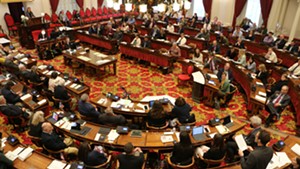
- Matthew Roy ©️ Seven Days
- The Vermont Statehouse
Vermont lawmakers have introduced a more modest boost to legislative pay than the one Gov. Phil Scott vetoed last year, but the bump would still be the sharpest pay increase in memory.
The reworked bill, S.224, is the latest effort to increase legislative compensation to make it easier for working-class Vermonters to afford to serve in the Statehouse.
“It is time to take a look at [pay] to make the job both more sustainable for members and also more accessible to other people who might be considering running for the legislature,” Sen. Ruth Hardy (D-Addison) said on Tuesday as her committee began taking testimony on the new bill.
Most of the state’s part-time lawmakers earn about $15,000 per year before expenses, which some say has helped create a General Assembly composed of mostly retired white people who can afford to serve.
Last year’s effort would have doubled a typical lawmaker’s pay over four years and boosted benefits. It was vetoed by Gov. Phil Scott.
The new version of the bill would no longer offer health care for lawmakers, but it would still boost pay for rank-and-file lawmakers by 74 percent.
Committee chairs and party leaders would receive the sharpest pay hikes — 106 percent — to reflect their additional workload and responsibilities. The leaders of each chamber would see their pay rise 66 percent.
If approved, the increases would take effect next year and cost an additional $2.5 to $3 million.
In an interview, Hardy noted that lawmakers have significant unreimbursed expenses, such as purchasing stationery and using personal phones for work.
"I think it’s reasonable for this to go into effect as soon as possible because people are making pretty large sacrifices to do this job," Hardy said.
 Supporters of the increase argue that the paltry pay and intense, part-time nature of the work make it extremely difficult for working-class Vermonters to serve. That deprives the General Assembly of badly needed diversity and contributed to an exodus of members last biennium, they say.
Supporters of the increase argue that the paltry pay and intense, part-time nature of the work make it extremely difficult for working-class Vermonters to serve. That deprives the General Assembly of badly needed diversity and contributed to an exodus of members last biennium, they say.
In his veto message, Scott skewered lawmakers for the sharp compensation hike.
“In my opinion, it does not seem fair for legislators to insulate themselves from the very costs they are imposing on their constituents by doubling their own future pay,” he wrote.
Despite Democratic supermajorities in both chambers, the legislature lacked the votes to override Scott's veto, a sign of the discomfort some lawmakers felt with boosting their own salaries.
Changes in the new bill could make it more palatable for members.
Lawmaker salaries would be pegged to the average Vermont salary, published every April by the Department of Labor. Estimates in the bill are based on the average salary in 2022, which was $59,190.
“So as the salary of Vermonters goes up or down, our average salary would potentially go up or down,” Hardy said.
Another change would create three tiers of pay based on legislative responsibilities.
The speaker of the House and the Senate president pro tempore would make the most, with pay based on 130 percent of the average Vermonters’ pay. Committee chairs' pay would be based on 110 percent of the average salary, and rank-and-file lawmakers' salary would be equal to that of average Vermonters.
The new bill would allow lawmakers to earn up to 20 days' pay when the legislature isn't in session. That's less than last year's compensation bill, which would have allowed lawmakers to earn 34 days' pay when out of session.
For example, the salary of a typical lawmaker this session is $15,180. That would increase to $21,627. The 20 days of off-session pay would add $4,553 for a total of $26,180. All told, that's a 73 percent pay increase, or about $11,000.
The off-session pay would no longer be automatic, either. Lawmakers would have to request it and attest that they worked on legislative issues that week, such as meeting with constituents. Political activities would not qualify.
 Committee chairs such as Hardy would enjoy the biggest bumps.
Committee chairs such as Hardy would enjoy the biggest bumps.
The chairs currently earn about $16,867, only slightly more than rank-and-file members. Under the new system, the chairs would earn $23,790 during the session, plus a stipend and up to 20 days of off-season pay. That’s a total of $34,717, or about $17,850 more than they earn now — a 106 percent increase.
The House speaker and the president pro tempore of the Senate, who already receive higher compensation for their leadership roles, would see their pay rise about 66 percent, from $31,236 to about $51,791.
Also boosting the total pay is a provision to pay lawmakers for their time when they are out of session during Town Meeting Day week each March.
But unlike last year's bill, lawmakers won't be eligible for state health care. After conferring with colleagues over the summer, Hardy said she removed the benefit to save money. The bill still lets lawmakers qualify for state flexible spending accounts, out of which health and child care expenses can be paid.
The bill would form a Legislative Service Working Group that would make recommendations about legislative compensation and benefits, staffing, administrative support, and the length of the legislative session. Hardy said studies have shown that women have a harder time than men in asking for raises.
At Tuesday's hearing, Sen. Alison Clarkson (D-Windsor) said the increases should be framed in the context of what people in the administration and judiciary earn.
"We're supposed to be three equal branches of government. Where's the equity?" she said.
The reworked bill, S.224, is the latest effort to increase legislative compensation to make it easier for working-class Vermonters to afford to serve in the Statehouse.
“It is time to take a look at [pay] to make the job both more sustainable for members and also more accessible to other people who might be considering running for the legislature,” Sen. Ruth Hardy (D-Addison) said on Tuesday as her committee began taking testimony on the new bill.
Most of the state’s part-time lawmakers earn about $15,000 per year before expenses, which some say has helped create a General Assembly composed of mostly retired white people who can afford to serve.
Last year’s effort would have doubled a typical lawmaker’s pay over four years and boosted benefits. It was vetoed by Gov. Phil Scott.
The new version of the bill would no longer offer health care for lawmakers, but it would still boost pay for rank-and-file lawmakers by 74 percent.
Committee chairs and party leaders would receive the sharpest pay hikes — 106 percent — to reflect their additional workload and responsibilities. The leaders of each chamber would see their pay rise 66 percent.
If approved, the increases would take effect next year and cost an additional $2.5 to $3 million.
"I think it’s reasonable for this to go into effect as soon as possible because people are making pretty large sacrifices to do this job," Hardy said.

- Courtesy
- Sen. Ruth Hardy (D-Addison) in 2018
In his veto message, Scott skewered lawmakers for the sharp compensation hike.
“In my opinion, it does not seem fair for legislators to insulate themselves from the very costs they are imposing on their constituents by doubling their own future pay,” he wrote.
Despite Democratic supermajorities in both chambers, the legislature lacked the votes to override Scott's veto, a sign of the discomfort some lawmakers felt with boosting their own salaries.
Changes in the new bill could make it more palatable for members.
Lawmaker salaries would be pegged to the average Vermont salary, published every April by the Department of Labor. Estimates in the bill are based on the average salary in 2022, which was $59,190.
“So as the salary of Vermonters goes up or down, our average salary would potentially go up or down,” Hardy said.
Another change would create three tiers of pay based on legislative responsibilities.
The speaker of the House and the Senate president pro tempore would make the most, with pay based on 130 percent of the average Vermonters’ pay. Committee chairs' pay would be based on 110 percent of the average salary, and rank-and-file lawmakers' salary would be equal to that of average Vermonters.
The new bill would allow lawmakers to earn up to 20 days' pay when the legislature isn't in session. That's less than last year's compensation bill, which would have allowed lawmakers to earn 34 days' pay when out of session.
For example, the salary of a typical lawmaker this session is $15,180. That would increase to $21,627. The 20 days of off-session pay would add $4,553 for a total of $26,180. All told, that's a 73 percent pay increase, or about $11,000.
The off-session pay would no longer be automatic, either. Lawmakers would have to request it and attest that they worked on legislative issues that week, such as meeting with constituents. Political activities would not qualify.

- Kevin McCallum ©️ Seven Days
- Sen. Becca White (D-Windsor) arguing for pay increases last session
The chairs currently earn about $16,867, only slightly more than rank-and-file members. Under the new system, the chairs would earn $23,790 during the session, plus a stipend and up to 20 days of off-season pay. That’s a total of $34,717, or about $17,850 more than they earn now — a 106 percent increase.
The House speaker and the president pro tempore of the Senate, who already receive higher compensation for their leadership roles, would see their pay rise about 66 percent, from $31,236 to about $51,791.
Also boosting the total pay is a provision to pay lawmakers for their time when they are out of session during Town Meeting Day week each March.
But unlike last year's bill, lawmakers won't be eligible for state health care. After conferring with colleagues over the summer, Hardy said she removed the benefit to save money. The bill still lets lawmakers qualify for state flexible spending accounts, out of which health and child care expenses can be paid.
The bill would form a Legislative Service Working Group that would make recommendations about legislative compensation and benefits, staffing, administrative support, and the length of the legislative session. Hardy said studies have shown that women have a harder time than men in asking for raises.
At Tuesday's hearing, Sen. Alison Clarkson (D-Windsor) said the increases should be framed in the context of what people in the administration and judiciary earn.
"We're supposed to be three equal branches of government. Where's the equity?" she said.
The committee is set to debate the bill again on Friday.
"There is some more work to do on the bill, and the committee will be taking seriously strategies to be sensitive to the fiscal impact," Hardy said.
"There is some more work to do on the bill, and the committee will be taking seriously strategies to be sensitive to the fiscal impact," Hardy said.
Correction, January 10, 2023: Due to an editing error, a previous version of this story misreported an element of lawmakers' pay when out of the session.














Comments
Comments are closed.
From 2014-2020, Seven Days allowed readers to comment on all stories posted on our website. While we've appreciated the suggestions and insights, right now Seven Days is prioritizing our core mission — producing high-quality, responsible local journalism — over moderating online debates between readers.
To criticize, correct or praise our reporting, please send us a letter to the editor or send us a tip. We’ll check it out and report the results.
Online comments may return when we have better tech tools for managing them. Thanks for reading.